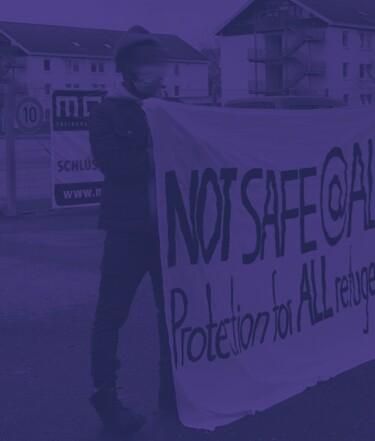
Exclusion from benefits pushes refugees into existential hardship
According to a new regulation, refugees for whose asylum procedure another EU country is responsible under EU law (Dublin procedure) are to be completely excluded from social benefits. This violates fundamental rights and breaches European law. We are taking legal action against the exclusion from benefits, which is forcing people into homelessness.
Since the end of October 2024, a new regulation in the Asylum Seekers' Benefits Act has excluded benefits for so-called Dublin cases. The regulation affects people who first applied for asylum in another EU country. This means that the first country of reception is responsible and people have to leave the country. Time and again, the departure fails, for example due to a specific agreement with the destination country. Nevertheless, the new regulation terminates people's entitlement to benefits after a two-week transition period, during which they already receive significantly reduced benefits. After the transition period, the authorities only have to provide benefits in cases of hardship, whereby homelessness, for example, is not such a case of hardship.
Those affected are dependent on voluntary benefits from the authorities and cannot claim urgently needed support in court. Numerous social courts, including in Rhineland-Palatinate and Baden-Württemberg, have overturned the exclusion of benefits and awarded full benefits due to concerns under European and constitutional law. Despite these developments, the Hamburg Office for Migration has decided to completely deny those affected the right to social benefits, which is a clear violation of the humane minimum subsistence level that other federal states should not take as an example. This has now also been confirmed by the urgent decisions of the Hamburg Social Court in April 2025 in the cases of our applicants.
Success in two summary proceedings
The Hamburg Social Court clarifies in two summary proceedings (S 7 AY 196/25 ER and S 5 AY 195/ER) brought by the GFF as well as in parallel proceedings: As long as the transfer to the responsible EU state has not yet taken place and voluntary departure is not actually possible, there is still an entitlement to social benefits.
These decisions show: This is not a case-by-case decision, but administrative practice in Hamburg must change fundamentally. This is an important legal clarification for the protection of a humane minimum subsistence level, which we were able to achieve together with lawyer Malena Bayer. The City of Hamburg can still lodge an appeal against the decisions.
Eyes wide open to the violation of fundamental rights
GFF experts already pointed out the impending legal violations during the legislative process and made it clear that those affected are threatened with homelessness and destitution in practice. The exclusion of benefits in the Asylum Seekers' Benefits Act, which has been in force since the end of October 2024, violates the guarantee of a humane minimum subsistence level. The minimum subsistence level guarantees the absolutely necessary means for a dignified life. This human right applies to all people who cannot provide for themselves adequately. It applies equally to German and foreign nationals - this was emphasized by the Federal Constitutional Court in 2012.
Incompatible with European law
The exclusion from benefits also violates the European Reception Conditions Directive (Directive 2013/33/EU). The directive stipulates that the EU state in which the person seeking protection is located must ensure an adequate standard of living. As long as refugees are in Germany, Germany must ensure their livelihood and the protection of their physical and mental health. Both the bridging benefit and the subsequent exclusion from benefits are in breach of the EU Directive. Those affected only receive accommodation, food and drink and €8.85 for “personal hygiene” during the two-week bridging period in Hamburg, for example. Medical treatment is only provided in the event of acute illness or pain. Those affected do not receive clothing and shoes. Benefits to cover a socio-cultural subsistence level, such as money for a cell phone or a bus ticket, are also no longer granted. After the two weeks, those affected are only entitled to hardship benefits.
Stop unconstitutional migration policy
The coalition agreement states: “We will ensure consistent implementation of the existing restrictions on entitlements in benefit law.” However, only laws that respect fundamental rights can be implemented. We will continue to go to court to protect fundamental rights.







